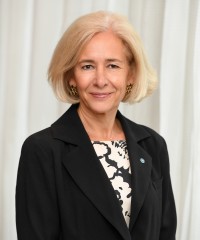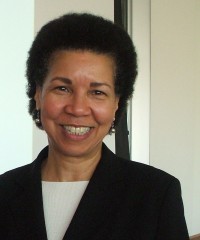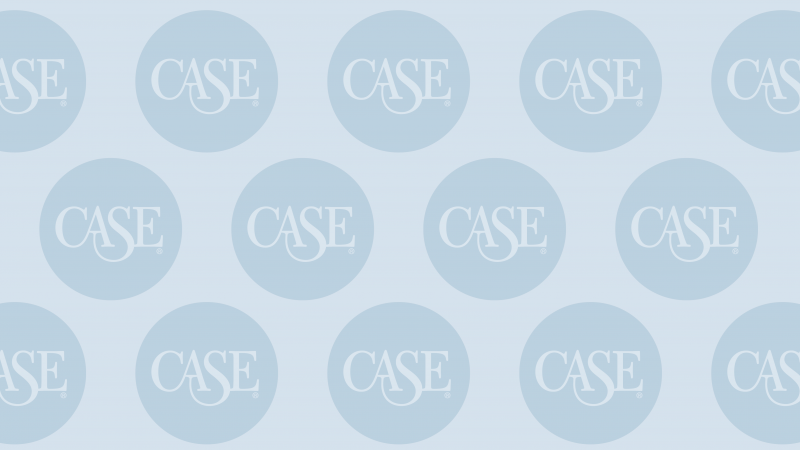Leading (and Learning) Through Change
It’s no small task to lead a team—especially today, as changes like turnover and remote work, shifts in fundraising trends, social and political issues, and much more shape advancement. Here, several faculty members for CASE Academy share the value of continuous learning, the best leadership advice they’ve received, and more.
CASE Academy is a unique, seven-month leadership course for advancement professionals. Taught by some of today’s most successful, respected leaders in the field, CASE Academy provides advancement professionals with the opportunity to engage with and learn from each other and from industry leaders. It’s based on the CASE Competencies Model, combining both strategic guidance and practical advice to prepare participants to serve as leaders throughout their career in the profession.

Marc A. Barnes

Sue Cunningham

Karen E. Osborne
CASE: What excites you most about what you do?
Marc Barnes: I love making an impact on people’s lives. Through my work, thousands of students get access to a quality education that changes the trajectory of not only their lives, but also that of their families and communities.
Sue Cunningham: The vision: advancing education to transform lives and society and the 92,000 remarkable people who work in our member institutions worldwide who get up every day to do just that!
Karen Osborne: Every week for 42 years and counting, I get to do something meaningful. Funding for our institutions and nonprofit organizations fuels the solutions to world, national, and community problems. Leading, teaching, and mentoring the advancement professionals who do this work is a privilege and a joyful endeavor.
CASE Academy is built on the CASE Competencies Model. Which competency are you leading a session on? Why does that competency matter for advancement leaders?
KO: I’m leading a session on strategic thinking—an essential skill for every position in advancement. It’s a superpower that helps advance careers and make individuals and leaders more effective in planning, priority setting, anticipating and solving problems, and taking advantage of opportunities. Learning, or burnishing one’s strategic thinking abilities, will have a positive impact on the institution, advancement unit, and an individual’s value to the team.
MB: I lead the session on the competency of relationship building. I tell the participants success in every other competency relies on our ability to establish and sustain strong relationships. It is the cornerstone of fundraising.
CASE: What’s the best piece of professional advice you’ve received?
SC: Only do what only you can do. Nurture those who work for you and empower them by allowing them to take responsibility for their work.
KO: I’ve been blessed all my career with attentive mentors and wise friends and family. I also worked for individuals who believed in staff development and in giving back to our profession. During the first year of my first job in institutional advancement, I volunteered at a CASE conference. Learning from that experience, I always invested in my teams’ growth and learning.
MB: It is not about you. It’s about the people you serve. Govern yourself accordingly.
We know—with the turnover and stress in the workplace—it can be a tough time be a leader. What’s your best advice for leading through periods of change or challenges?
MB: First, leaders must be able to understand and accept change and challenges themselves. Those are natural aspects of every organization and operation. With that perspective, leaders can help others navigate inevitable changes and difficult situations. Also, leaders must lead with empathy and a willingness to compromise when appropriate.
Finally, leaders should know the people they lead. People have varied capacities to understand and deal with change. Meet them where they are and work with them based on their personalities.
KO: This is a big topic with lots of elements, but I will focus on three.
- Ask both strategic and generative questions. Listen. Ask follow-up questions. You must understand the specifics of the change, the reasons for it, the vision of how things will be at the conclusion of the change, and anticipate an array of possible obstacles and outcomes.
- As Stephen Covey taught us, focus on the urgent/important tasks and the not urgent/important ones. Say, “no,” to the rest, so you can say, “yes,” to what really matters. This will give you time to think strategically and act accordingly.
- Finally—and this one is almost always sacrificed during periods of change—take care of yourself. You can’t lead effectively when you’re exhausted, neglecting those people and activities that fill you with a sense of well-being and boost your energy levels. Your productivity and effectiveness will increase when you take care of you. Plus, you model the behavior your team needs to embrace as well.
CASE: Where do you find inspiration?
SC: From CASE colleagues, CASE volunteers, and CASE members for their dedication, creativity, and commitment. And my friends across the CASE global network who I have grown to know and trust throughout my career. And of course, my family: my son, my husband, and my dog, Wombat!
In month seven, CASE Academy participants will explore “leadership beyond advancement,” or the capabilities, experiences, and qualities that distinguish leaders. What’s something surprising or unexpected that’s shaped your leadership? (Maybe an unusual piece of advice, a surprising learning experience, etc.)
KO: Mastery in leadership is a journey. I learned early on, by making mistakes, that leadership requires a growth mindset. I don’t have to know all the answers. Humility and vulnerability are key.
As part of that journey, I learned that my job is to create a motivating learning environment for each of my team members and give them the resources they need to succeed. And I learned to steward my relationships: to help the people around me believe they matter, their work matters, and they are making a difference.


